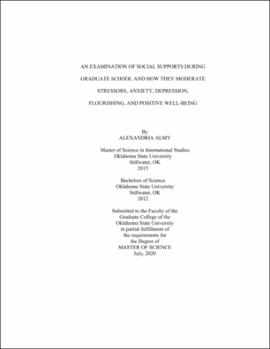| dc.contributor.advisor | Sittner, Kelley | |
| dc.contributor.author | Almy, Alexandria | |
| dc.date.accessioned | 2021-02-22T22:41:09Z | |
| dc.date.available | 2021-02-22T22:41:09Z | |
| dc.date.issued | 2020-07 | |
| dc.identifier.uri | https://hdl.handle.net/11244/328640 | |
| dc.description.abstract | Considering the significant number of graduate students (nearly 4.1 million in the U.S.) and the apparent lack of contemporary research on graduate students and mental health, this study strove to apply past research to an understudied population with hopes of sparking action for institutional change and change to a proactive versus reactive approach to mental health care. This study examined both negative and positive mental health outcomes of graduate students and how those outcomes were impacted by stressors and social support. An online survey broken into sections over stress, mental health, and social support was sent to all graduate students at a four year institution. The sample size was 260; an important note is that missing data analysis has not yet been conducted. The mean age was 31 years old, 67.50% of participants identified as a cisgender woman, 52.92% were out-of-state students, and half of the sample reported excellent or good physical health. Pearlin et al.'s (1981) stress process model was applied to the stressors, social support, and mental health of graduate students. Aneshensel and Uchechi (2014) summarize how beneficial the stress process model has been in stress research due to the study of what influence our social environments have on exposure to stressors, how the variance of access to personal and socials resources can play, and the roles of moderators on the effect of stressors on mental health. The following hypotheses were confirmed: graduate students who experience more stressors will have higher anxiety and depressive symptoms and lower flourishing and positive well-being; graduate students who have stronger social support will have lower levels of mental distress. These findings may serve as a starting place for discussing and discerning intervention practices to implement in graduate school to enhance and improve the mental health of graduate students and doing so from a positive well-being approach. | |
| dc.format | application/pdf | |
| dc.language | en_US | |
| dc.rights | Copyright is held by the author who has granted the Oklahoma State University Library the non-exclusive right to share this material in its institutional repository. Contact Digital Library Services at lib-dls@okstate.edu or 405-744-9161 for the permission policy on the use, reproduction or distribution of this material. | |
| dc.title | Examination of social supports during graduate school and how they moderate stressors, anxiety, depression, flourishing, and positive well-being | |
| dc.contributor.committeeMember | Schmitz, Rachel | |
| dc.contributor.committeeMember | Ritchie, Liesel | |
| osu.filename | Almy_okstate_0664M_16835.pdf | |
| osu.accesstype | Open Access | |
| dc.type.genre | Thesis | |
| dc.type.material | Text | |
| dc.subject.keywords | flourishing | |
| dc.subject.keywords | graduate student | |
| dc.subject.keywords | mental health | |
| dc.subject.keywords | stress process model | |
| thesis.degree.discipline | Sociology | |
| thesis.degree.grantor | Oklahoma State University | |
